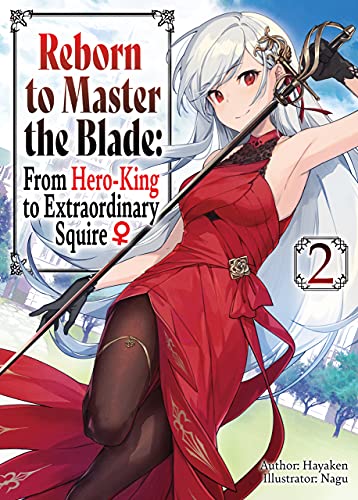By Hayaken and Nagu. Released in Japan as “Eiyu-oh, Bu wo Kiwameru tame Tensei su. Soshite, Sekai Saikyou no Minarai Kisi ♀” by HJ Bunko. Released in North America by J-Novel Club. Translated by Mike Langwiser.
In general, when you’re reading a series that stars a big dumb person who only likes fighting, you’re not supposed to be on their side. The reader can see that there are advantages to talking things through, or do finding another way, etc. But, of course, there’s fighting anyway, because our hero just leapt in there and starting whaling away. That’s definitely true with Inglis in this second volume. What’s worse, her fights are almost all one-sided beatdowns, as she is ludicrously strong and powerful, even without any runes or talent of that sort. She is every reader’s OP nightmare. And yet… let’s face it, while reading this book, I was agreeing with her. The parts of the book that really came alive and felt like the most fun were those where Inglis had her sword out and was fighting monsters, or bad guys, or bad guys turned into monsters. She’s great fun as a meathead. The rest of the book has trouble keeping up with her.
Now that she and Rafinha are in the Academy, Inglis is ready to start learning. And by learning I mean “learning how to fight stronger and stronger opponents”. She and Rafinha have very few problems, mostly as they’re the cool kids. Leona, on the other hand, their new friend whose brother turned traitor, is having a terrible time, especially when her new roommate (the princess curl type) refuses to live with her. On their first day the three of them happen to come across a sea monster which they prevent from destroying a ship… a ship that turns out to be owned by the Rambach Company, whose heir became a Highlander in the first volume, if you’d forgotten. As a reward, they’re invited to be guards for a very important summit meeting between the company and various factions. Could it be a trap? No worries, I’m r pretty sure Inglis can punch traps away.
As noted, the fun in these books is seeing how ludicrous Inglis is all the time. We get occasional mention of her past as a male king, mostly when she’s trying not to gawk at women in the bath, but for the most part it’s just a flimsy excuse to have Inglis be less “ladylike” than some folks would like. Rafinha is supposedly her voice of reason… but is almost as bad as she is, occasionally trying to stop her but more often joining in. They’re also both desperate for food, another fun running gag, as chunks of this book are written in “Talk-with-your-mouth-full-ese”. There are actual political things going on and genuine danger to the city and country… but Inglis is content to leave that to the royal family and the knights who have to worry about politics. Indeed, her suggestion to allow the woman currently spewing out monsters on occasion to stay at the academy is “cool, monsters to fight without sneaking out!”.
So, basically, if you like smart intelligent girls and politicking, this is not the series for you. If you read it and think “I wish there was even more of Inglis hitting things”, by all means keep reading, I’m sure you will be satisfied.
